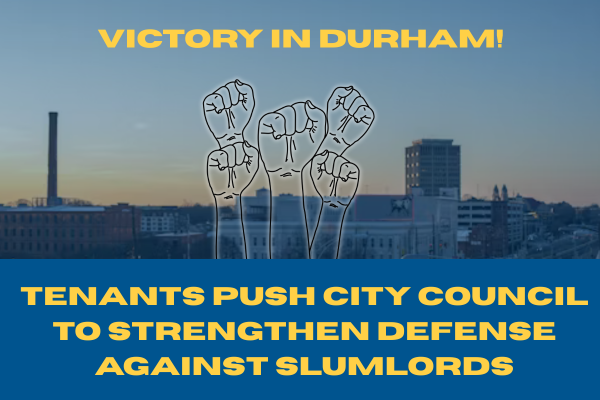Tenants claimed a major victory Monday as the Durham City Council unanimously voted in favor of a new ordinance that would criminalize the collection of rent by landlords overseeing dangerous and unlivable conditions. TTU members have been working for several months to secure this ordinance; attending multiple work sessions, gathering stories from their neighbors, driving a city-wide petition drive, and ultimately filling the council’s chambers to show the depth of community support.
Per the new ordinance, landlords can be charged with a misdemeanor if they collect rent on housing that has immediately dangerous conditions; rotted or damaged structural supports, unsafe wiring, unsafe roofs, no potable water supply, no operating heating equipment in cold months, no operable sanitary facilities, severe pest infestation, no safe or unobstructed exits on ground levels, among other violations. The language of the policy was first crafted by the Riverside High School Affordable Housing Club over the course of the past year. TTU members are thrilled to have supported these young people’s efforts and ensure the passage of this critical ordinance.
More than 20 speakers backed by a supportive crowd mobilized by TTU approached the City Council on Monday, sharing their experience with unsafe and undignified housing conditions imposed by landlords with long track records of neglect. The show of force by Durham tenants made it clear during council deliberation that the citizenry would not support changes to the measure that would weaken a tenant’s ability to leverage city code when confronting landlords.
“My fridge has been broken for months. I asked my landlord to fix it, replace it, to do his job. Instead, I was forced to spend my own money to buy a new refrigerator to store my insulin. That expense left me behind on rent and now my landlord is trying to evict me because I had to do his job for him.” Says Ms. Brenda Solomon, a TTU Tenant Leader, “We need this ordinance so tenants like me don’t face the consequences for our landlord’s failures”
Despite vocal opposition from the landlord industry lobbyists, the Triangle Apartment Association and from the Realtors Association, tenant and people power prevailed. After more than three hours of comment and discussion, the ordinance was approved in its original, most effective form.
“I have been without heat now for a week, due to their negligence”, Said Vincent Lawrence a TTU member and resident of Willard St. Apartments, “I’ve called, I’ve left messages, they won’t even call me back. I am a senior and disabled – This is not right. The City Council needs to support this (ordinance) because this will give a voice to us.”
Before this ordinance passed, tenants suing their landlords to get back rent and necessary repairs were required to jump through complex legal hoops to argue about the precise amount of abatement, or back rent, they were owed. This ordinance makes it clear: unlivable means unlivable. Now, these conditions mean that the landlord owes them back 100% of their rent.
This measure will be an invaluable tool for tenants organizing with their neighbors to win repairs. If landlords are unlawfully collecting rent on dangerous units, they could be charged with a misdemeanor each time. When tenants face eviction for non-payment from units with these dangerous conditions, this ordinance means that their full rent should be refunded. When the amount owed back to a tenant is more than the amount owed, tenants almost always win their eviction case.
ORDINANCE “GIVES US A LEGAL TOOL TO FIGHT BACK AND TO LIVE WITH BASIC DIGNITY”
In their fight for better policy, tenants working with TTU have shared their experiences dealing with landlords who see them as mere numbers or even obstacles for further profit.
“This ordinance is a shield for our most vulnerable neighbors. It’s for the elderly residents living with black mold who are too afraid to complain for fear of a retaliatory eviction. It’s for my undocumented neighbors, enduring severe pest infestations because their landlord counts on their silence.” Said Brianda Barrera, a TTU tenant leader and public health professional “This ordinance gives us a legal tool to fight back and to live with the basic dignity everyone deserves.”
Tenants who spoke at preceding Durham City Council work sessions noted that landlords across the city take advantage of a permissive environment to abuse marginalized tenants with few housing options. In a housing market where more than 50 percent of Durham tenants are considered rent burdened based on income, landlords pursuing a gentrification strategy have slow-walked maintenance of properties lacking basic amenities and imposing multiple safety hazards. The intent is to maximize profit by minimizing maintenance costs and often for tenants to break their leases in desperation or to otherwise be pushed out after conflict with staff while trying to fix dangerous conditions. Additionally, many of Durham’s immigrant population with language barriers find themselves in unsafe housing with increasing pressure to stay put and tolerate the conditions.
The ordinance evokes similar motions passed in Charlotte, Pinesville, and Pittsboro, bringing Durham one step closer to a basic standard of pro-tenant policies that center every day citizens over the demands of property owners that have priced regular, working families.
“In my public health career, I’ve learned two fundamental truths: First, that housing is a human right. And second, that housing is healthcare,” said Barrera. “The quality of our housing is one of the most impactful social determinants of health. A person cannot manage diabetes in a home with no running water. A child cannot overcome asthma in an apartment with black mold and a pest infestation. And no one can heal when they are shivering in a home with no heat in the winter.”
Triangle Tenant Union will start training tenants on how to leverage the new ordinance to advocate for themselves and will continue its ongoing work of organizing with tenants to demand their dignity and the full value of their hard-earned rent.

